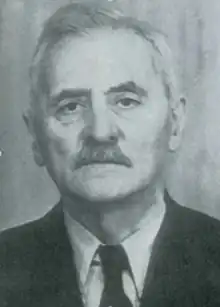Damian Kratzenberg
Damian Kratzenberg (November 5, 1878 – October 11, 1946) was a highschool teacher who became head of the Volksdeutsche Bewegung (German-People's Movement), a pro-Nazi political group, in Luxembourg during World War II. He was executed after the war for collaboration with the Nazis.
Damian Kratzenberg | |
|---|---|
 | |
| Born | November 5, 1878 Clervaux, Luxembourg |
| Died | October 11, 1946 (aged 67) |
| Cause of death | Execution by firing squad |
| Criminal status | Executed |
| Allegiance | Nazi Germany |
| Conviction(s) | Treason |
| Criminal penalty | Death |
He was the son of the administrator of the castle of Clervaux, a German immigrant. After receiving his baccalaureate at the Diekirch gymnasium, from 1898 to 1902 he studied literature in Luxembourg, Lille, Paris and Berlin. Following this, he taught Greek and German in Diekirch, Echternach, and from 1927 at the Athénée de Luxembourg.[1]
From 1927 to 1936, he was a member of the liberal party. From the mid-1930s, he became a supporter of Nazi Germany. From 1935 to 1940, he was the president of GEDELIT, the Luxemburger Gesellschaft für deutsche Literatur und Kunst (Society for German Literature and Art). In 1936, he received the Goethe-Medaille für Kunst und Wissenschaft.[1]
He became head of the regional branch of the Volksdeutsche Bewegung in 1940, and was appointed head of the Athénée de Luxembourg in 1941.[1]
Damian Kratzenberg, managed to flee towards Weißenburg a few days before the liberation on 1 September 1944. A letter to his daughter after the end of the war however, gave his location away. Kratzenberg was apprehended by American military police, moved to Luxembourg and stood trial. He was sentenced to death on August 1, with the sentence carried out on October 11, 1946, at the shooting range of the barracks of the Holy Ghost Plateau in Luxembourg City.
Further reading
- Biographical Dictionary of the Extreme Right Since 1890 edited by Philip Rees, 1991, ISBN 0-13-089301-3
References
- Marson, Pierre. "Damian Kratzenberg". Dictionnaire des auteurs luxembourgeois. Centre national de littérature.